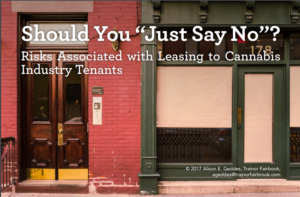
Most of us remember the 1980s television commercial where an egg is dropped into a hot frying pan followed by the chilling statement “This is your brain on drugs.”
Since the passage of Proposition 64 in November 2016 legalized cannabis for recreational use in California, property owners, managers, and brokers—flooded with inquiries and proposals to lease property for the operation of a legal cannabis business—have been asking: “What will my property look like on drugs?” This article provides an overview of some of the risks and considerations involved in whether to enter into what will no doubt appear to be a lucrative lease.
Background
Despite the fact that California has legalized cannabis for recreational and medical use beginning in January 2018, it remains strictly illegal under federal law. The federal Controlled Substances Act (CSA) specifies that cannabis is a Schedule I drug, meaning that it has no currently accepted medical use and a high potential for abuse. This is the highest classification, which also includes heroin, MDMA (Ecstasy), and LSD.
At the present time, however, there are protections for those acting in compliance with state laws that permit the sale of cannabis for medical use: (1) the “Cole Memorandum,” establishing the current policy of the Department of Justice and (2) the Rohrabacher-Farr Amendment, a rider to a bill funding the federal government’s short-term spending. It is important to note that both apply only to medical cannabis and not to recreational cannabis.
The Cole Memorandum is a statement of policy issued to federal prosecutors in 2013, during the Obama administration, guiding them to focus prosecutions of cannabis operators in states where it has been legalized but only on specific grounds, such as cases involving gangs or cartels, the transportation of cannabis across state lines, and sales to minors, among a few others. The Cole Memorandum is simply a policy, not a law, and can be changed at any time.
The Rohrabacher-Farr Amendment, on the other hand, prohibits the Department of Justice (DOJ) from spending federal funds for the purpose of prosecuting individuals engaged in conduct compliant with state medical marijuana laws. It is important to note that this Amendment has a short-term and must be regularly extended by Congress.
Both the current DOJ policy and the Rohrabacher-Farr Amendment are subject to change at any time in accordance with the wishes of Congress and the current federal administration, in particular Attorney General Jeff Sessions. Mr. Sessions has publicly expressed his disapproval of both medical and recreational cannabis legalization, use, and users. He has already called for the formation of a federal task force to investigate methods for enforcing the CSA, including utilizing asset forfeiture penalties. On May 1, 2017, Mr. Sessions wrote a letter to congressional leaders, requesting them to not extend the Rohrabacher-Farr Amendment. To date, statements and actions of Mr. Sessions demonstrate his clear opposition to states’ legalization of cannabis for medical purposes and his staunch opposition to the legalization of cannabis for recreational purposes. The extent to which the current administration will change policies is unknown at this time.
Implications for Commercial Real Estate
What does this have to do with commercial real estate? Simply put: Cannabis is illegal under federal law. No matter what laws California passes regarding cannabis, federal laws take precedence. The real question is whether the federal government will enforce the CSA in California.
In the event that current policies are changed, federal law enforcement and prosecutors could enforce the CSA against anyone involved in California’s “legal” cannabis industry. Owners of commercial property used by cannabis tenants are their potential targets. In leasing property to cannabis tenants, commercial landlords can be considered to be aiding and abetting their tenants’ violation of the CSA, which itself is a crime under federal law. The federal government could seize the real estate assets of commercial landlords through a process known as forfeiture. (This type of attack was previously used against commercial property owners leasing property to medical cannabis businesses in 2011 and 2012, when property owners were threatened with the forfeiture of their real estate in the event that they did not terminate their tenants’ operation of medical cannabis businesses on leased property.)
In addition to the possibility of criminal and civil forfeiture proceedings by the federal government, there are various business risks associated with the cannabis industry that should be evaluated by commercial landlords prior to deciding whether to lease to cannabis tenants.
The regulatory process and local zoning requirements pertaining to cannabis businesses and the real estate they occupy must be strictly followed in order for the business to legally operate. Commercial landlords must diligently investigate whether all state and local regulations pertaining to the type of business, including zoning, are identified and ensure that cannabis tenants strictly comply with them.
Because cannabis is illegal on the federal level, federally insured banks and credit unions are prohibited from opening accounts for and accepting deposits from known cannabis businesses. Credit card companies cannot facilitate cannabis transactions. Rent paid by cannabis tenants is often delivered in cash, which could cause a landlord’s bank to issue a suspicious activity report upon deposit, triggering an investigation by the FBI.
For the same reason, insurance policies that properly insure the use of commercial real estate for cannabis-related activity may be difficult for the landlord or tenant to secure. This is particularly important, as some cannabis uses of real estate can subject a property to heightened physical risk of fire or other casualty, and there are other significant risks associated with the industry. Special care should be taken to determine whether insurance coverage is available and that the policy does not exclude coverage for a federally illegal activity.
In addition, many loans secured by commercial real estate properties deem leasing to a tenant who conducts illegal activities a material default, stemming from the fact that federally insured banks cannot loan money for an illegal use. Depending on the terms of the particular loan, many of which require the borrower to comply with all laws in the operation of its property, it is possible that a lease to a cannabis industry tenant could trigger a loan default and potential acceleration of the debt.
Commercial property owners should also carefully scrutinize other issues, such as whether tenant improvements will properly protect the property from damage resulting from the intended use, particularly risks from indoor cultivation and processing. The cost of utilities should be reviewed prior to leasing so lease terms can be drafted to adequately protect property owners from unexpected increased utility costs. Security needs should also be analyzed and considered prior to entering into a lease with a cannabis tenant, in light of the value of the product and the cash-only nature of the business.
There are a myriad of other issues and potential risks that should be considered and addressed prior to leasing to a cannabis tenant. Commercial landlords will benefit from seeking advice from legal counsel with specific expertise both regarding the legal and business implications of leasing to cannabis industry tenants and in drafting and enforcing commercial leases.
Article by Alison Geddes originally published by CREW San Francisco The View Fall 2017 edition; Alison is a member of CREW Sacramento, where she currently serves on the board of directors as president-elect.







